Provost's Teaching Awards winners
18 July 2008
Link:
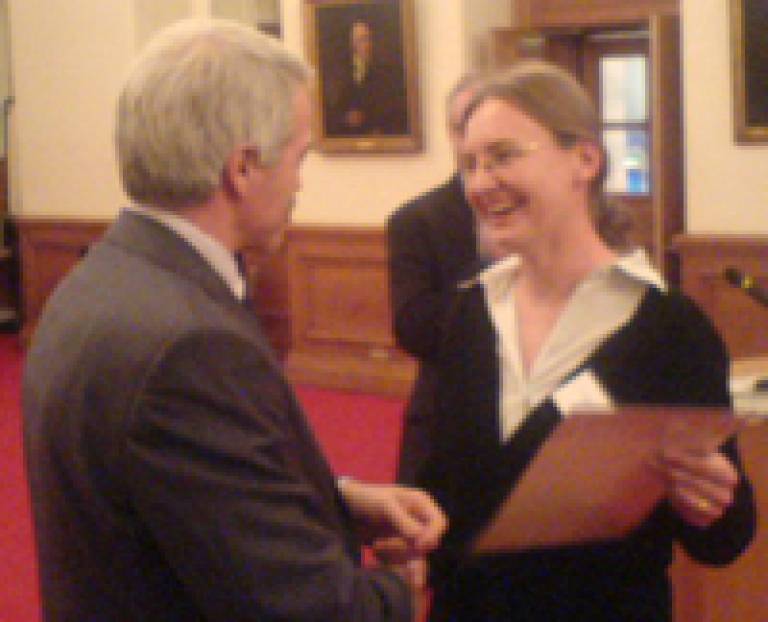 ucl.ac.uk/teaching-learning/awards-funding/provosts-teaching-awards" target="_self">Provost's Teaching Awards
ucl.ac.uk/teaching-learning/awards-funding/provosts-teaching-awards" target="_self">Provost's Teaching Awards
Eleven members of UCL were presented with Provost's Teaching Awards on 17 July 2008, in recognition of their outstanding contribution to excellence and innovation in teaching.
The second annual awards serve to showcase UCL's pedagogic expertise and leadership, and to demonstrate the university's commitment to continuous innovation in the teaching it offers its students.
Presenting the awards, UCL President and Provost Professor Malcolm Grant said the awards were a key aspect of ensuring that teaching was promoted in the context of a research-intensive university. He was delighted to honour the outstanding achievement that benefited so many students.
UCL Vice-Provost (Academic & International) Professor Michael Worton noted that the awards' four categories reflected the spectrum of contribution to the learning experience: Beginning of Career, Experienced Staff, Postgraduate Teaching Assistant and Supporting Learning.
The winners of the 2008 Provost's Teaching Awards follow.
Beginning of Career
Dr Karen Radner (UCL History)
- joined UCL in September 2005
- designed a new course called 'Power & Knowledge in Ancient Mesopotamia'; in one session students make their own cuneiform tablets
- new course to be taught from 2009 on 'Peace, Law & Human Rights: Middle-Eastern Gifts to United Nations'. This will invite students to think about how concepts from the Ancient Near East have shaped contemporary internationalisation
- her ancient history courses also involve the students learning about the contemporary politics of the Middle East. She has also designed and launched an e-learning resource on translations and transliterations of a vast range of sources including letters and reports from scholars advising Assyrian monarchs on astrological and medical matters. This project makes materials available to non-specialists as well as academics
Experienced Staff
Dr David Bender (UCL Biosciences)
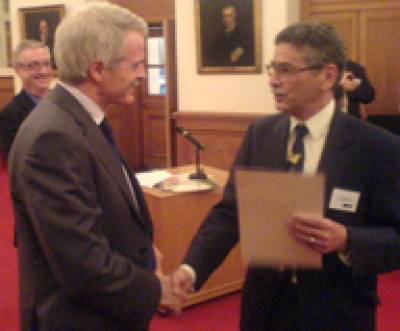
- has written and developed a suite of computer programmes that are simulations of laboratory exercises in biochemistry; versions of these programmes are now used in 30 universities around the world
- wrote and developed a computer programme that permits nutrient analysis of foods and diets that is now used by 3,000 schools and colleges in Britain and adopted in 2003 for use across Northern Ireland for use in all schools and colleges
- wrote and developed another computer programme, 'Testme' that allows students to answer true/false multiple-choice questions and see explanations of why they were correct or not
- introduced and developed the concept of "small-group teaching for large groups of students" and a series of problem-solving paper cases that are used for both assessment exercises and as the basis for tutorial discussions for medical students. Thirty such paper cases developed so far
- developed a system for providing individual feedback to medical students from their formative assessment using mail merge to email, so that each student receives a detailed breakdown of the marks for each question and paper and can compare his/her marks with class distribution of marks
Dr Peter Delves (UCL Infection & Immunity)
- has edited several critically acclaimed text books and encyclopaedias (which have been translated into various languages)
- introduced the use of the TurningPoint Personal Response System as a tool for formative assessment based upon clinical case studies. For this, he collaborated on the technical aspects of PRS with Dr Dugan Witherick (UCL Physics & Astronomy), and on pedagogic aspects with Phil Riding (UCL Learning Technologies Support Service). PRS enables small-group interaction within large groups, and gives instant and comparative feedback for formative assessment. For instance, students can be reassured when they see that a question that they thought difficult was perceived similarly by their colleagues
- the PRS-based approach to learning and formative assessment resulted in saving 96 hours of academic staff time plus the many hours of administrative time needed to organise the small-group facilitation sessions that occurred before
Dr Tim Beasley-Murray (UCL School of Slavonic & East European Studies)
- in his course on political philosophy, 'The History of European Political Ideas', he introduced a 'contractual' model of teaching that aims to develop a political and learning community
- at the first session, he presents the students with a draft contract that they are encouraged to debate, amend and eventually sign. The form of the contract draws on the tradition of authors studied in the course, so according to this, students agree to give up freedoms, to take on responsibilities and to perform duties for their individual and collective good. They also gain a say in how the course is run - and have the opportunity to renegotiate the contract as they learn more about political ideas
- contributed to fostering interdisciplinarity, notably through organising an introductory workshop in methods of area-studies research
Dr John Eyre (UCL Civil, Environmental & Geomatic Engineering)
- pioneered the studio-based concept in the teaching of design - which before him had been dominated by a mathematical approach. This has involved encouraging the students to think from the first principles of outcomes: what do I want this structure to be, to be like and how do I want it to function? This has led to them challenging the status quo of current views of how things should be done
- this approach is now welcomed by professional institutions (Civil Engineers and Structural Engineers)
- the emphasis that he brings to studio-based project work with opportunities for student self-discovery, original and creative thinking and various kinds of communication has revolutionised engineering teaching and contributed to the major revolution that has been led in UCL Civil, Environmental & Geomatic Engineering by Professor Nick Tyler
- he also has involved several local companies and, after discussions with one of the directors at Ove Arup & Partners, set up a new MSc course along the lines he had been using at the undergraduate level
Dr Mark Lake (UCL Institute of Archaeology)
- the author of the standard advance text 'GIS in Archaeology'. His design of the MSc in GIS & Spatial Analysis in Archaeology aims both to provide pathways for research-orientated and vocational students, and also to ensure that students are able to deploy advanced technical skills with genuine theoretical understanding of their utility
- another example of his innovative approach to curriculum development is found in his use of enquiry-based learning for the masters course Research Skills for Spatial Analysis in Archaeology, which gives students direct experience of planning and executing a research project, and fosters their independent, real-world problem-solving skills. The course is organised around the construction and review of a research-grant application, followed by execution of the chosen project and, finally, critical reflection on the entire process
- Mark established the UCL Institute of Archaeology e-Resources Working Group, which is carrying out a detailed review of the institute's e-learning
- he also worked with the UCL Turnitin Coordinator and institute colleagues and devised procedures so that Turnitin (the plagiarism software) is used in ways that (1) are formative rather than purely punitive, (2) ensure equal treatment of students by indicating that all coursework should be submitted to Turnitin where practicable and (3) minimise the impact on academic staff time
- he oversaw the appointment and training of two postgraduate teaching assistants to act as Turnitin advisors and create Turnitin classes, as well as overseeing the training of academic staff and of students
Dr Greg Campbell (UCL Biosciences)
- the teaching award to Greg goes especially for his work on the teaching of histology (anatomy at the microscope level)
- over the last eight years, student numbers have almost doubled to 900 - and UCL did not have enough resources to give personal microscope time for every student. He therefore decided to use the software package Digital SlideServer, which uses very high-quality scanned images of UCL's own microscope slides that the students then view on computer screens. Rather like using Google Earth, they can zoom into images of the tissue in question and enlarge. This encourages self-directed learning by prompting students to find and to label specific features
- the programme is now being used not only by MBBS students but students from a wide range of departments ranging from the UCL Institute of Archaeology and UCL Anthropology through to UCL Pharmacology
Dr Adam Wojcik (UCL Mechanical Engineering)
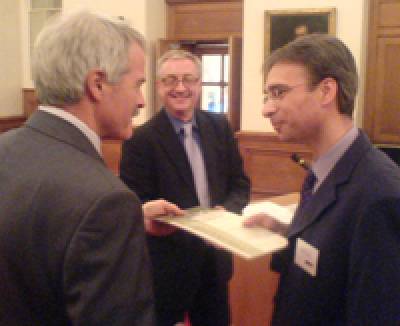
- Adam came to UCL Mechanical Engineering in 1995 after seven years in industry and set about redeveloping content for four courses covering material sciences and engineering in every year of the undergraduate programmes
- he also has, for the past 10 years, administered the 1.5 course unit group design project module taken by fourth-year MEng students - which is central to the development of students 'soft skills', as well as their advanced technical knowledge. This has been the vehicle for many successful group efforts including our Formula Student entries and the Solar Fox car - which crossed Australia by solar power
- he maintained the academic rigour of the original syllabus, but crucially realigned the course by dividing it into two distinct parts, taught on different days of the week: materials selection (what to use and when) and materials failure (corrosion, fatigue, fracture, etc). These two sections were then linked by an over-arching theme - design
- the individual essay-based material selection assessments were jettisoned and replaced by group-orientated case study assignments. These were many, many investigative projects which students undertook in groups of two. They were asked to procure consumer products which they could then dismantle and study
- at the beginning students were provided with a choice of product sourced by Adam. However, levels of enthusiasm have grown to the point where almost all groups now self-source
- he plans to enhance the courses further, perhaps through the development of an 'adversarial' aspect, using pairs of groups acting as the consumer and the manufacturer of products. He is currently working on these with Dr Liz Read, who is seconded from the Royal Academy of Engineering
Dr Stephen Instone (UCL Greek & Latin)
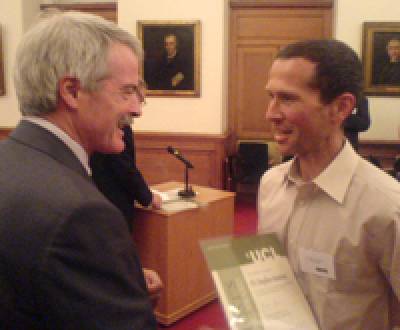
- has taught in UCL Greek & Latin for 21 years, during which time he has taught every Greek and Latin language course the department offers, plus many other non-language-based courses
- Pindar is one of the most difficult of the great lyric poets of ancient Greece. He wrote poems in honour of victorious athletes and Stephen has brought life to these poems by giving practical demonstrations of, for example, longjump with jumping weights and manoeuvres in the pancration (all-in wrestling)
- the students greatly enjoy his language-acquisition courses, as they chant out loud Greek and Latin irregular verbs
- Stephen has transferred his teaching methods to the language and culture degree run by UCL Scandinavian Studies, teaching part of the core course for that degree
- he is also coordinator of the interdisciplinary 'Life & Death in the Ancient World' course, which is for all students from UCL Greek & Latin, UCL History and the UCL Institute of Archaeology
- he also runs the London School in Classics, encouraging students from all ages to learn Latin and Greek at all levels
Postgraduate Teaching Assistant
Rachel Morley (UCL School of Slavonic & East European Studies)
- Rachel is taking a PhD on Early Russian Cinema. She has responsibility for two courses: 'Russian Cinema: History, Politics, Society' (first year) and 'Russian Cinema: Men & Women' (second year)
- Rachel has achieved superlative scores in the student evaluations for both courses. She encourages a supportive and friendly atmosphere, but she also carefully structures the ways in which she organises tutorial discussions and gives "very detailed feedback" on written coursework
- in advance of film viewings, she distributes documents of 'points to consider', and discussions are carefully tailored to the needs of the students, many of whom are studying film for the first time
- at the beginning of the course, the students are given these 'points to consider' documents as a lecture handout; by the end of the course they are drawing up their own 'points to consider' on the basis of the film viewing
Supporting Learning
Judy Medrington, Academic Administrator, UCL Institute of Archaeology
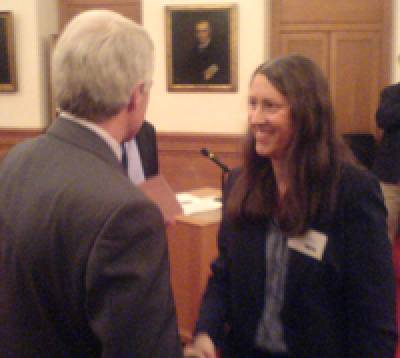
- has been 30 years at the UCL Institute of Archaeology
- has worked tirelessly to build a supportive and sympathetic environment for students. As a result, their students generally feel a real sense of belonging and great loyalty to the institute - and this in turn gives rise to a sense of social responsibility and engagement with the community, as is testified by the large number of volunteers to the mentoring scheme, very active student engagement with the Staff-Student Consultative Committee and engagement in volunteering activities
- devised an Undergraduate Student Progress Form which asked students to assess their own progress critically and to comment on how they intend to address any shortcomings. This was in order to provide something much more constructive than simply handing down judgements and to encourage our students to take responsibility for their own progress
- also devised a procedure for the processing and assessment of course evaluation forms, which includes a requirement that teachers discuss with their classes the comments that have been made on the forms and inform the classes of steps that will be taken to address issues raised
To find out more about the awards, use the link at the top of this article.
 Close
Close

